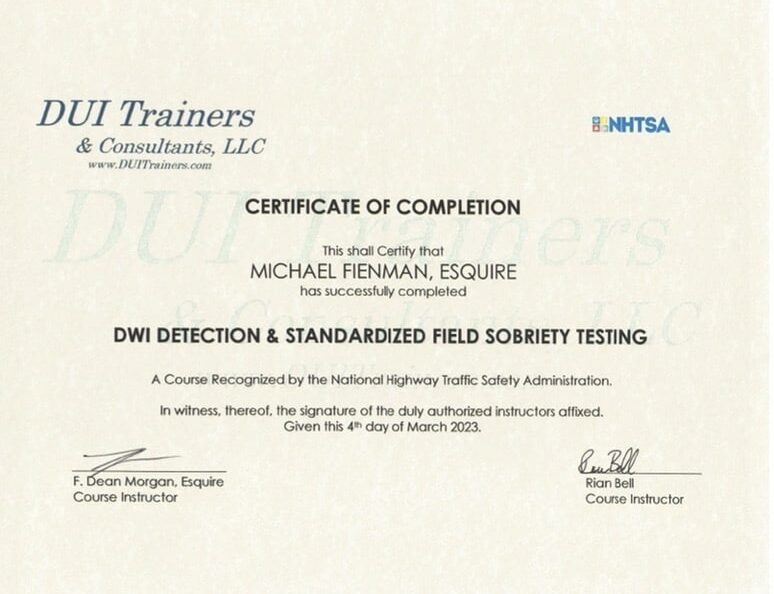DUI Charges in Philadelphia, PA: An Overview
Under Pennsylvania law, 75 Pa. C.S. § 3802, a person can be charged with DUI if their blood alcohol content (BAC) is 0.08% or higher, or if they are impaired by drugs or alcohol to the point of being unable to safely operate a vehicle. However, even BAC levels below 0.08% can result in charges if impairment can be established.
Pennsylvania enforces a three-tier DUI system, which categorizes offenses based on the driver’s BAC level:
- General Impairment (0.08–0.099%)
- High BAC (0.10–0.159%)
- Highest BAC (0.16% and above)
DUI Penalties in Philadelphia
Each DUI tier carries escalating penalties, from probation and fines for first-time DUI offenders in the lowest tier to jail time, license suspension, and mandatory ignition interlock devices for repeat offenses. Additionally, aggravating factors like underage DUI, a car accident, driving under the influence of drugs, or endangering a child can significantly increase penalties.
First-Time DUI
- General Impairment (0.08–0.099% BAC): Up to $300 fine, 6 months probation, alcohol safety school.
- High BAC (0.10–0.159%): $500–$5,000 fine, 48 hours–6 months jail, 12-month license suspension.
- Highest BAC (0.16%+): $1,000–$5,000 fine, 72 hours–6 months jail, 12-month license suspension.
Second DUI
- General Impairment: $300–$2,500 fine, 5 days–6 months jail, 12-month suspension, ignition interlock device.
- High BAC: $750–$5,000 fine, 30 days–6 months jail, 12-month suspension.
- Highest BAC: $1,500–$10,000 fine, 90 days–5 years jail, 18-month suspension.
Third DUI
- General Impairment: $500–$5,000 fine, 10 days–2 years prison, 12-month suspension.
- High BAC: $1,500–$10,000 fine, 90 days–5 years prison, 18-month suspension.
- Highest BAC: $2,500–$10,000 fine, 1–5 years prison, 18-month suspension.
Aggravating Factors & Other DUI Related Offenses
Certain DUI charges carry enhanced penalties in PA. Multiple DUIs can escalate to felonies, resulting in longer imprisonment, higher fines, and extended license suspensions. Likewise, if you are convinced of three DUIs or DUI related offenses in 3 years, you may be labeled as a habitual DUI offender. Driving under the influence with a minor passenger (endangering the welfare of a minor aka EWOC) often leads to felony charges, increased fines, prolonged jail time, and mandatory treatment. Similarly, drugged driving incurs penalties comparable to alcohol-related DUIs, often with additional treatment and education requirements.
Additional Consequences of a DUI in Phila.
A DUI conviction impacts more than fines or jail—it can significantly increase insurance rates, harm job prospects, and jeopardize professional licenses in fields like healthcare, insurance or education. It may also affect college admissions, financial aid, and personal relationships, creating long-term financial and emotional challenges.
Other Negative Effects of a DUI Conviction
- Court fees and fines
- Payment for installation, maintenance, and removal of the ignition interlock device
- Payment for public transportation or rideshares
- Higher auto insurance premiums once you can drive again
- Difficulty finding or maintaining a job
- Impact on your child custody or visitation arrangement
- Difficulty with your immigration, naturalization, or citizenship status
Addressing DUI charges with legal guidance is critical to minimizing these consequences.
Pennsylvania’s DUI Look-Back Period
Pennsylvania employs a 10-year look-back period, meaning any DUI offense within the past decade influences sentencing for current charges. Under Title 75, Section 3806, prior offenses during this timeframe can elevate penalties for the newest case, emphasizing the importance of legal representation to navigate potential consequences.
Phila DUIs & Your Driver’s License
A DUI in Philadelphia can lead to immediate and long-term consequences for your driving privileges. Depending on your BAC and prior offenses, penalties include DUI license suspension ranging from 12 to 18 months and mandatory ignition interlock devices for repeat offenders. Refusing a chemical test results in an automatic one-year license suspension under Pennsylvania’s implied consent law.
Protecting your license requires swift action. With the help of a skilled DUI lawyer, you may qualify for alternatives like the ARD program, house arrest, work release or impatient treatment to reduce penalties and avoid long-term suspensions.
Philadelphia DUI Arrest Stats
As of November 2024, Philadelphia reported 927 DUI arrests since January, reflecting an uptick from the 2023 total of 975 DUI arrests. Notably, areas such as Allegheny Avenue, Broad Street, Lehigh Avenue, and Kensington Avenue have historically seen higher incidences of DUI arrests.
To address impaired driving, law enforcement has implemented initiatives like sobriety checkpoints and the “Drive Sober or Get Pulled Over” campaign, aiming to deter and reduce DUI occurrences.
For the most current and detailed DUI arrest statistics in Philadelphia, consulting the Philadelphia Police Department’s crime statistics or the Pennsylvania State Police reports is recommended.
Why You Need an Experienced Philadelphia DUI Lawyer
Not all defense attorneys are equipped to handle the complexities of a DUI case. In fact, most lack a complete understanding of the DUI protocol that police are trained on. Many defense attorneys do not even consider a DUI charge defendable unless there is an invalid stop of the vehicle. Those attorneys lack the training and skills to spot other issues (SFST administration problems, blood draw problems, breathalyzer calibration or testing issues) that may provide a viable defense to the case. Look for an attorney who understands Pennsylvania’s DUI laws, including the state’s three-tier penalty system, and has experience scrutinizing police reports, BAC test results, and field sobriety procedures.
An experienced Philadelphia DUI attorney like Michael H. Fienman brings advanced DUI testing certifications, established relationships with local courts, and a track record of DUI dismissals or reduced penalties. Beyond his training, Mr. Fienman brings significant experience from defending other DUI matters throughout Pennsylvania and New Jersey.
He has worked with expert scientists and chemists who developed breathalyzer testing machine technology and supervised laboratories where DUI blood draw specimens are tested. Because of his vast experience in the field of DUI defense, Mr. Fienman has successfully challenged DUI charges where other lawyers were ineffective and unable to assert a viable defense. Fienman Defense ensures you have the personalized and strategic defense you need to challenge DUI evidence, avoid harsh consequences, and protect your freedom.
Related Reading:4 Police Mistakes That Can Dismiss Your Case
Why Choose Fienman Defense for Your Phila DUI
Michael H. Fienman holds the same DUI detection certifications as law enforcement officers and has years of experience dismantling the prosecution’s case by identifying procedural errors and flawed evidence.
Read: The Many Benefits of SFTS Training for DUI Lawyers
Fienman Defense will guide you through every step of your case, from fighting for your license to negotiating favorable outcomes, ensuring you have the best chance to preserve your future. Don’t leave your freedom to chance—call Fienman Defense today.
Award-winning DUI Defense
Best DUI Lawyer in Philadelphia by National Council on DUI Defense
10.0 Rating from Justia
Rising Star Super Lawyer
Preeminent for Ethical Standards & Legal Ability by AV Martindale-Hubbell
14 Best Criminal Defense Lawyers by Newsweek
Top 10 Criminal Defense Attorneys under 40 by National Academy of Criminal Defense Attorneys
Fienman Defense: Skilled Representation for All DUI Scenarios
Attorney Michael H. Fienman has extensive experience defending against a wide range of DUI-related charges in in Philadelphia and the surrounding areas on Montgomery County, Delaware County, Chester County, Bucks County, and New Jersey, including:
- First-Time DUI Offenses
- Repeat DUIs (Second, Third, or Multiple Offenses)
- Felony DUI
- DUI on Probation
- EWOC: DUI with a Minor Passenger
- Drugged Driving
- Prescription Drug DUIs
- DUI with Firearms
- Driving on a DUI Suspension
- Underage DUI
Attorney Michael H. Fienman, licensed in Pennsylvania and New Jersey, is a seasoned trial attorney with extensive criminal and traffic defense experience. Holding certifications in DWI detection and Standardized Field Sobriety Testing (NHTSA), he zealously defends clients in state, federal, and administrative courts, leveraging his training and expertise to achieve the best outcomes.
Free consultations available. Call (215) 398-1944.
Arrested for DUI in Philadelphia? What You Need to Know
When pulled over for a suspected DUI in Philadelphia, it’s important to remain calm and know your rights. The officer must have reasonable suspicion to stop you, such as observing you weaving in traffic or failing to stop at a sign. Avoid admitting guilt, answering incriminating questions, or performing unnecessary tests—politely inform the officer you wish to speak to an attorney.
DUI Stops: What the Police Look For
- Fumbling when you try to find your driver’s license
- If your breath smells like alcohol
- Flushed face
- Glassy or bloodshot eyes
- Slurred speech
- Staggering or swaying when you leave your car
Philadelphia DUI Testing
During a DUI stop, officers often administer field sobriety tests to assess intoxication. These DUI tests include the walk-and-turn, one-leg stand, and horizontal gaze nystagmus test. While failing these tests may lead to an arrest, physical conditions or other factors unrelated to alcohol can impact your performance, making them unreliable as conclusive proof of impairment.
After an arrest, you may be required to undergo chemical testing to measure your blood alcohol content (BAC). Under Pennsylvania’s implied consent law, refusing this test results in a mandatory one-year license suspension. However, DUI tests, including breathalyzers, are not foolproof—medical conditions or improperly calibrated equipment can yield inaccurate results. A skilled DUI attorney can review these factors to challenge the validity of the prosecution’s evidence.
If arrested, you may be asked to take a chemical test under Pennsylvania’s implied consent law; refusal leads to an automatic license suspension but does not prove guilt.
What to Expect During & After a DUI Arrest
Following a DUI arrest, you’ll be processed, which may include being held for a few hours before being arraigned or released.
Pleading guilty without fully evaluating the Commonwealth’s case may lead to quicker resolution but can result in harsh penalties, including jail time, fines, and license suspension. Working with an experienced DUI attorney can help you explore alternatives like house arrest or the Accelerated Rehabilitative Disposition (ARD) program for first-time offenders.
Related Reading: 7 Mistakes People Make After Being Arrested for Drunk Driving
Defending Against Philadelphia DUI Charges
Defending a DUI charge requires a strategic and detailed approach. Attorney Fienman leverages his experience to uncover errors and weaknesses in the prosecution’s case while also exploring opportunities for DUI reduction or diversion programs. His comprehensive approach to DUI defense includes:
- Reasonable Suspicion for the Traffic Stop: If the police lacked proper justification to pull you over, evidence obtained during the stop may be inadmissible.
- Probable Cause for Chemical Testing: Without valid grounds to administer a chemical test, results can be suppressed.
- Accuracy of Chemical Tests: Calibration issues, improper administration, or medical conditions affecting results can cast doubt on BAC evidence.
- Illegal Search and Seizure: Evidence from an unlawful search violates your Fourth Amendment rights and may be excluded.
Possible DUI Defense Strategies
Attorney Fienman crafts a defense tailored to your circumstances, which may include:
- Challenging Impairment Evidence: Conditions like allergies, illness, or fatigue can mimic signs of intoxication bias DUI test results, such as bloodshot eyes or slurred speech.
- Invalid DUI Checkpoints: In Philadelphia, DUI checkpoints are commonly set up along major roads like Broad Street and Roosevelt Boulevard, near nightlife areas such as South Street and Old City, and around the Philadelphia Sports Complex after events. These checkpoints must adhere to strict legal standards, including pre-approved locations and clear markings. An experienced DUI lawyer can examine whether these guidelines were followed and challenge any violations.
- Driver Identity Disputes: If the police did not witness you driving, they must prove you were behind the wheel.
- Discrediting Police Reports: Inaccurate or exaggerated police reports can be exposed to undermine the prosecution’s case. In addition, getting access to the arresting officer’s employment history can be helpful in a DUI case in certain situations.
Mitigation & DUI Alternative Resolutions
In addition to building strong defenses, Attorney Fienman works to secure the best possible outcome, including:
- Reduced Charges: Negotiating to downgrade DUI charges to lesser offenses, minimizing penalties.
- Treatment Programs: Advocating for alcohol or drug treatment options to address underlying issues and reduce sentences.
- Accelerated Rehabilitative Disposition: For eligible first-time offenders, ARD offers a path to avoid jail time and dismiss charges upon successful completion.
- Other Diversion Programs: Tailoring solutions like probation or community service to avoid harsh consequences and preserve your record.
Acting Fast After a DUI Protects Your Future
Addressing a DUI charge promptly can be the difference between severe penalties and a manageable resolution. Attorney Fienman pursues every opportunity to reduce charges, avoid jail time, and protect your driving privileges. Call (215) 839-9529 today for a free DUI consultation.
DUI Success Stories
- ARD for Bucks County DUI
- No Jail for New Hope DUI
- Nursing Student Given ARD After a DUI
- Underage DUI Resolved without Court
Read More DUI Case Results & Resources
Phila. DUI Charges: Frequently Asked Questions
Can the Police Pull Over Anyone for a DUI?
No. The police need reasonable suspicion to pull you over. For example, you are driving too fast or too slow or weaving between lanes.
If the Police Ask If I’ve Been Drinking, What Should I Say?
Legally, you are only required to provide your driver’s license, vehicle registration, and proof of insurance. You do not have to answer any questions, and in fact, a Philadelphia DUI lawyer encourages you to remain silent. You can politely say, “I’m not going to answer questions or discuss my day.”
Do I Have To Get Out of My Car at a DUI Stop?
Yes, if the police ask you to step out of the vehicle, you should. Try to remain calm to avoid escalating the situation.
Should I Take a Field Sobriety Test?
You do not have to take a field sobriety test. The officer who pulled you over may have already made up his or her mind that you were driving drunk, and they want you to take a field sobriety test for more evidence. If you choose not to take the test, it may support their belief that you are over the legal limit. However, if you are inebriated and you take the test, you may provide more evidence of your condition. If you are intoxicated, politely decline to take a field sobriety test and tell them you would like to talk to your attorney.
Can I Refuse To Take a Field Sobriety or Breath Test?
You may refuse to take a field sobriety test, a breath test, or both. There are no legal consequences for refusing a field sobriety test. If you turn down the breath test or blood draw, the Pennsylvania Department of Transportation automatically suspends your driver’s license.
Can I Get My License Back Sooner After a DUI?
A Philadelphia DUI lawyer can help you get your driving privileges reinstated. It is possible to shorten a license suspension if you agree to an ignition interlock device.
How Can I Get a DUI Dismissed in Philadelphia?
The chances of getting a DUI charge dismissed in Philadelphia depend on various factors, including the specifics of your case, the strength of the evidence against you, and any procedural errors made by law enforcement. An experienced DUI lawyer can significantly improve your chances of a dismissal or other favorable outcome.
How Long Will a DUI Stay on My Record in PA?
In Pennsylvania, a DUI conviction stays on your criminal record for life. However, certain first-time DUI offenses may be eligible for expungement if you complete a diversionary program like ARD (Accelerated Rehabilitative Disposition).
Do I Need a DUI Lawyer?
It is in your best interest to have an experienced DUI lawyer to protect your rights and help keep you from jail or other penalties. Police (and ineffective attorneys) may claim DUI cases are “open and shut,” but skilled attorneys with the proper training and experience can successfully challenge evidence and identify procedural flaws in the investigation. Representing yourself leaves you vulnerable to severe consequences, while a lawyer maximizes your chance of reducing or dismissing charges.
How Much Does a DUI Lawyer Cost in Philadelphia?
The cost of hiring a DUI lawyer in Philadelphia varies based on several factors, including the attorney’s experience, the complexity of the case, and the time required to prepare and represent you. Lawyers may charge either an hourly rate or a fixed fee. Hourly rates depend on the lawyer’s reputation and experience, while fixed fees provide a clear total cost for handling a DUI case. Some attorneys might also require a retainer upfront, and there may be additional costs for expert witnesses or other expenses.
To Fight DUI Charges in Philadelphia – Contact Fienman Defense
Facing a DUI in Philadelphia? Get top -tier defense and secure the best possible outcome. From a DUI dismissal, reduction, or to prove you’re innocent drunk driving, we can help. Avoid jail time, save your license, and protect your future with an experienced Philadelphia DUI lawyer. Free consultations available. Call (215) 398-1944.







